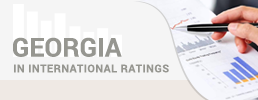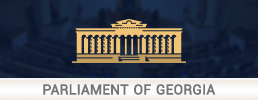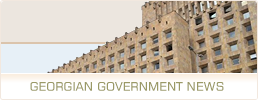
Georgia Worries About Ukraine Fallout
By Joe Parkinson
Wall Street Journal
25 February 2014
TBILISI, Georgia-The protests that toppled Ukraine's government had a special resonance for Georgia, another former Soviet republic that has struggled to move closer to Europe and found itself in a fight with Moscow.
Hundreds of demonstrators in Georgia's capital and other cities gathered on the streets nightly, waving Ukrainian flags, lighting candles and singing Ukraine's national anthem. A Facebook FB +0.13% campaign saw thousands of Georgians change their hometown to Kiev and blackout their profile pictures to show support for the uprising.
"They are fighting for freedom and we wanted them to know that we were there for them. We share a destiny because we've both been historically bullied by Russia," said Tamara Gurchiani, a human-rights lawyer and protest organizer who demonstrated in Tbilisi for a month.
Georgia, a small but strategically placed country of 4.5 million in the Caucasus mountains, feels itself especially vulnerable: It lost swaths of territory five years ago after fighting a brief war with Russia in which hundreds of people were reported killed.
On Tuesday, Georgia's foreign ministry said Russian troops had resumed construction of barbed wire fences along a buffer-zone close to the breakaway republic of South Ossetia, which Moscow backs.
"Today's events deepened our suspicion that Russia is preparing many provocations before the association agreement is signed," Foreign Minister Maia Panjikidze was quoted as saying by Georgia's state news agency.
She was referring to the trade and political agreement that Georgia, along with Moldova, are set to sign later this year. It is the same type of pact that Ukraine's former president, Viktor Yanukovych, abandoned late last year under pressure from Moscow, triggering the protests that ultimately led to his downfall and the loss of dozens of lives.
Partly to avoid the Russian pressure that torpedoed those deals, EU and Georgian leaders have accelerated the timetable for signing the pact, moving it up to August from September, if not sooner.
Georgia's leaders also flew this week to Washington, where the White House reaffirmed its "strong support" for Georgia's sovereignty and territorial integrity. Prime Minister Irakli Garibashvili met with President Barack Obama and Vice President Joe Biden on Monday.
"I think it's good for the Georgians and others to try to expedite the association signature and get as much support as possible at this critical time," said Sabine Freizer Gunes, a senior fellow in Istanbul at the Atlantic Council's Eurasia Center. "There is an opportunity now in European capitals now to emphasize the fact that the Eastern neighborhood is in a sensitive spot and is in need of greater support."
Moscow is anxious to maintain influence over states it dominated during Soviet times, especially those with energy pipelines and significant ethnic Russian communities.
Coverage of the power struggle in Ukraine in other post-Soviet states mirrored Russian state television, which characterized the protests as a foreign-backed, far-right coup. President Aleksandr Lukashenko of neighboring Belarus, one of the first to sign up for a Moscow-led customs union, said that there will be no such protests in his state.
In such an atmosphere, some Georgians worry about mounting pressure from the Kremlin.
"The prospects for greater Russian pressure on Georgia are growing as Moscow feels its losing prestige. We're not expecting an intervention but we know they have a lot of levers they can pull here and that is an alarming prospect," said Irakli Porchkhidze, vice president of the Georgian Institute for Strategic Studies, a Tbilisi-based think tank.
Mr. Garibashvili's government refrained during the Kiev protests from making statements that could antagonize Moscow. But the prime minister has also played down the idea that Russia has as anymany tools to use against Georgia as it did with Ukraine, for example.
Russia's hold over the Georgian economy has diminished as a result of trade embargoes tied to the political tensions; Russia took just 7% of Georgia's imports last year, according to official data. For Ukraine, Russia is its single-largest trading partner, although the 28-nation EU as a whole is bigger. Russia also supplies more than half of Ukraine's natural gas.
Georgia's ties with Russia have been slowly improving after the 2011 election of Mr. Garibashvili's party, the Georgian Dream coalition. Russia this year lifted bans on imports of Georgian wine, mineral water and fruit that were imposed in 2006.
But diplomatic relations, severed after the August 2008 war, haven't been restored and Russia still controls the two breakaway regions whose independence it backed.
Support for Ukraine in Georgia isn't a new phenomenon. The two countries enjoyed a period of close ties after going through revolutions in 2003 and 2004. Ukraine's former president Viktor Yushchenko, and former Georgian president Mikheil Saakashvili supported each other's efforts to keep Moscow at arm's length.
This time, for some the support was more than symbolic: Two Georgian citizens were among the dozens of protesters killed in Kiev, according to local media.
"The people in Kiev weren't fighting only for Ukraine but also for Georgia. We've both fought repeatedly to chart our own path," said Achiko Guledani, a music producer who helped organize the solidarity protests.
"Our heart all the time was in Maidan," he said, referring to the square that was the center of Kiev's protest movement. "Our future was also being decided there."
http://online.wsj.com/news/articles/SB10001424052702303880604579405190753044638










